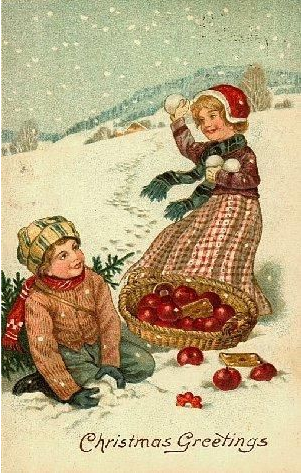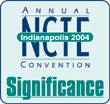|
In This Issue:
-
Literature:
You Just Can’t Get Away from It
-
“Father
Christmas” or Charles Dickens?
-
NCTE: A
Revelation for an MC English Major
-
Survey Says?
“Father
Christmas” or Charles Dickens?
By: Megan
Carlson

In Rob Hale’s Victorian
Culture class, we have just finished “A Christmas Carol” by Charles
Dickens. After 164 years, “A Christmas Carol” is still part of the
holiday tradition and in celebration of the season, here are some
interesting Christmas facts about "A Christmas Carol” and Victorian
England.
-
By the beginning of
the 19th century, festivities for Christmas had become sparse
because as Robert Southey in 1807 claimed, “In large towns the
population is continually shifting; a new settler neither
continues the customs of his own province in a place where they
would be strange, nor adopts those which he finds, because they
are strange to him, and thus all local differences are wearing
out.”
-
Britain was in need of
new Christmas traditions and because work had become so
important, people were unable to take off multiple days for
celebrating.
-
“A Christmas Carol”
has preserved the Christmas customs of olde England and fixed
our image of the holiday season as one of wind, ice, and snow,
and smoking bishop (heated red wine, oranges, sugar, and
spices), piping hot turkey, and family cheer within.
-
“A Christmas Carol”
was written in just six weeks.
-
Before settling on the
name of Tiny Tim, three other alliterative names were
considered. They were Little Larry, Puny Pete, and Small Sam.
-
Christmas cards
originated in the early 1840’s. This was actually not
influenced by Dickens, but by Sir Henry Cole who made too many
cards to send out to friends and had them sold in at stationer’s
shop. The idea did not catch on to the public until the
1880’s. Twelve of the original cards exist today.
-
Before the holly and
the mistletoe, wealthier homes in Victorian England used a
“kissing bough” as the main decoration for the season. Two
hoops were joined to make a globe and were decorated with
greenery, oranges, and apples, and mistletoe.
-
The year that Dicken’s
died, Theodore Watts-Dunston overheard a Cockney girl’s reaction
to the news of his death: “Dickens Dead? Then will Father
Christmas die too?”
Although Christmas
traditions are still going strong even with the death of Charles
Dickens, his influence on the holiday is prevalent. Thanks to the
Victorians, we have many of our Christmas traditions today. Enjoy
the season and Merry Christmas!
All information taken from
www.victorianweb.net.
NCTE: A
Revelation for an MC English Major
By: Anne Stone

Last month, I
traveled to New York City with Dr. Moni Hayes of the Education
department and fellow writing tutor Whitney Helfrich to
present at the National Council of Teachers of English. NCTE is an
annual conference for English teachers, comprised of hundreds of
presentations in a 5-6 day time period.
Whitney plans to teach Spanish when she graduates, and my only
aspiration involving teaching is teaching college courses, so we
were not the typical conference attendees, however, we had a great
time presenting and brought back valuable ideas and lessons.
Sometimes as
an English major, I get burnt out writing countless papers and
reading multiple works at a time. Being an English major is not
easy; it requires a lot of time, and a lot of thinking. It was so
refreshing, though, to see how important reading and writing is, and
how those skills are gaining more and more importance in every area
of academia. One of the sessions that Whitney and I attended was
presented by four teachers at a non-traditional school in New
Mexico. They discussed the importance of writing in their lives,
and also in their work. The most interesting part of their
presentation was the way that they integrated writing throughout the
curriculum, even in math and science courses. Variations of this
method are quickly growing in schools, but it is something that I
missed out on in my later elementary and high school years. Luckily
for all of us, writing throughout the disciplines is something that
Monmouth College values, and while I’m sure all of us sometimes feel
frustration building as writing and reading assignments pile up,
these skills we’re honing are beneficial for the rest of our lives.
Another
interesting session we attended regarded grading.
There were three presenters, and Whitney and I were astounded at the grading rubric of one presenter. Only 20% of the total points given
for the project concerned content, and
the majority of the remaining points for
her high school writing class dealt with grammar and mechanics. As
writers at Monmouth College, we are taught that grammar and
mechanics are important, but formulating
ideas and arguments are weighed much heavier. Whitney and I were so
dumbfounded by this grading practice that it became the topic of our
conversation for the remainder of the day.
grading rubric of one presenter. Only 20% of the total points given
for the project concerned content, and
the majority of the remaining points for
her high school writing class dealt with grammar and mechanics. As
writers at Monmouth College, we are taught that grammar and
mechanics are important, but formulating
ideas and arguments are weighed much heavier. Whitney and I were so
dumbfounded by this grading practice that it became the topic of our
conversation for the remainder of the day.
Overall, our
trip to NCTE taught a lot about English, instruction, and even more
about the quality of the English major at Monmouth College. As I
listened to presenters and analyzed the information they brought
forth, I found that the rigor and depth with which we complete our
degree at Monmouth College will prepare us to accomplish anything
for which we strive after college, whether that path be a career,
graduate school, or some other endeavor. The next time I complain
about the English department requirements and workload, I will
remember what I heard and saw at NCTE, and be thankful that I am
part of the Monmouth College English department instead of some
second-rate department… like Knox.
Literature: You
Just Can’t Get Away from It
By:
Erik Davis
This year I have written a series of articles
examining how English is taught at different Liberal Arts Colleges
in the Midwest Conference. As a conclusion to this series I thought
it would be appropriate to look at how literature is dealt with in
other disciplines here at MC. I sent out a questionnaire to the
faculty here at Monmouth College that asked how they use literature
in their classes. I received several responses from people in many
different departments.

In the CATA department Prof. Van Kirk had this
to say, “In CATA101 I use a book called Eats, Shoots & Leaves
by Lynne Truss, to illustrate why punctuation matters in
communication.” This book has received much acclaim lately as it
deals with comma usage and other types of punctuation in an amusing
and interesting way. Prof Van Kirk also said that she used, “…a
book called Leave Me Alone, I'm Reading, by Maureen Corrigan,
a book reviewer for NPR and a literature professor at Georgetown
University. It is a memoir about how her love of books has
influenced her life.” Prof. Van Kirk went on to explain that this
book is an extremely effective way to illustrate the power of the
written word.

Dr. Wallace gave a presentation on the
different ways that he views a text when directing a play. He made
the point that directors see the text as being much less sacred.
They are often forced to change words or cut out passages. In the
English department we would never dream of skipping over large
sections of a work, but as a director Dr. Wallace explained that he
has to make those kinds of decisions. These decisions are necessary
Dr. Wallace said because as a director your purpose is to try and
make the play work for the audience. Any play by Shakespeare makes
for an excellent example. Shakespeare’s works, as with most
canonical literature, has many different meanings on multiple
levels. In our discipline we revel in the multiple meanings and
interpretation of a passage or of an entire work. Dr. Wallace
explained that as a director your job is to pick one or two of the
possible meanings in a play and expose those to the audience. This
is usually done simply because of time constraints. In Hamlet
a full production containing every line and encompassing everything
would take over four hours each production. That, Dr. Wallace
explained, is simply too long for any audience. The audience would
loose interest. This illustrates one of the major differences
between drama and English-- drama must keep entertainment paramount.

In the history department Dr. Urban talked
about the different ways that he has used novels in his courses. He
said, “I often use novels in my courses, Fiction can take liberties
with the facts, but good fiction has a compelling narrative and is
based on facts.” Dr. Urban went on to say that good historical
fiction is driven by the facts of history and can sometimes fill in
gaps in history. Dr. Urban said, “A good instructor will point out
where fact ends and fiction begins, thus illustrating important
aspects of the historian's craft.” Dr. Urban sees novels as an
excellent supplement to the study of history. Dr. Urban sums things
up this way, “Bottom line: effective teaching requires resources
that students will read and will remember. Good historical fiction
does both.”

Another member of the history department Dr.
Farias has used novels in many of her courses. When she teaches
Western Civilization II she uses Candide by Voltaire and
The Prince by Machiavelli. She uses these two books to discuss
different ways of viewing life and reality. Both of these works
make for excellent discussion in class, and the students seem to
really enjoy it. This is just the type of supplemental use of
literature that Dr. Urban was referring to earlier. The books are
not necessarily the focus of the class, but instead a means to get
at some of the central ideas of a culture or time period. This is
not so far removed from the way we study literature in our English
courses.

The last faculty member I will spotlight hails
from the music department. Prof. Richter said that he often uses
poetry when he is teaching. Next semester he is using two poems in
particular, “Cornhuskers” by Carl Sandburg and “God’s World” by Edna
St. Vincent Millay. He uses poetry in different ways in his
courses. Prof Richter explained one way he uses poetry is by
analyzing the rhythm and meter of a poem and then relating that to
music. This is yet another way of looking at a text. The focus in
this particular use of the poem is not so much on the meaning but on
the mechanics of the poem. In the English department the meaning is
always paramount, and often we do not examine the mechanics in
detail unless they make some comment on the meaning of the work.
Music often deals with poetry that has been set to music. This
complicates dealing with the work itself significantly. A conductor
must deal with the meaning of the words and the meter of the poem,
but all of that must be in the context of the musical setting. The
music is, of course, what is paramount to a musician.
All of these very different ways of teaching
and exploring literature in the different disciplines on campus just
goes to show how widespread literature is. It is a significant part
of many of the different disciplines on campus.
Survey Says!!!!

"You Can't Always
Get What You Want"
1.) What book would
you like to get at the English Department Christmas
Party?
2.) What book did you actually end up with at the end of
the party?
1.) "I
would love to get something that I haven't read yet. Maybe a lusty
romance would be a nice light read for the 14 hr plane ride I shall
take to France."
2.)
The Curious Incident
of the Dog In the Night-Time by Mark Haddon
-Maddy Ethington
1.)
Catcher In The Rye
2.) The Spoon River
Anthologies
Ryan Gutierrez
1.) White Oleander
by Janet Fitch. I just finished this a week or
so ago and have decided I need my own copy.
Melissa Bankes
1.)
Bad
As I Wanna Be: The Dennis Rodman Story
2.)
It was a Dark and Stormy Night
Amanda Bloomer
1.)
Honestly, I am interested in reading The Life
of Pie by Yann Martel because Professor
Belschner has done a lot of talking about it in
British Survey!
Natalie Pistole
1.)
I’m not picky… I’d be happy with just about
anything I don’t have and haven’t read!
2.)
A
fabulous anthology of Renaissance
drama! "Woohoo!" (laced with sarcasm)
Shannon Slee
1.)
I
really don't mind, just please no Nicholas
Sparks : ) Sorry Mitt!
2.)
The Lost Adventures of Sherlock Holmes (I'm
super excited, though Rob threatened to steal
it), The Complete Biography of Ella Fitzgerald,
and Gendered Lives (another one of Marlo's many
books).
Paige Halpin
1.)
I like anything fantasy/adventure like Inkspell
or Inkheart, any of the Ptolmey's Gate books,
any of Amelia Atwater-Rhodes first four books
(Forests of the night, Demon In My View,
shattered mirror, midnight predator) I also love
mythology, especially Greek. Anything in that
general area is good for me.
Katie Moore
|




 grading rubric of one presenter. Only 20% of the total points given
for the project concerned content, and
the majority of the remaining points for
her high school writing class dealt with grammar and mechanics. As
writers at Monmouth College, we are taught that grammar and
mechanics are important, but formulating
ideas and arguments are weighed much heavier. Whitney and I were so
dumbfounded by this grading practice that it became the topic of our
conversation for the remainder of the day.
grading rubric of one presenter. Only 20% of the total points given
for the project concerned content, and
the majority of the remaining points for
her high school writing class dealt with grammar and mechanics. As
writers at Monmouth College, we are taught that grammar and
mechanics are important, but formulating
ideas and arguments are weighed much heavier. Whitney and I were so
dumbfounded by this grading practice that it became the topic of our
conversation for the remainder of the day. 




